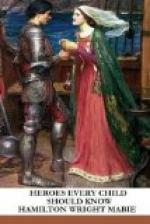Now is there any truth in all this story? I think there is thus much, that Alfred, for some reason or other, thought he was under the special protection of Saint Cuthberht. For several years after 880 there was peace in the land, and for a good many more years still there was much less fighting than there had been before. It was no doubt at this time that Alfred was able to do all those things for the good of his people of which we hear so much. He had now more time than either before or after for making his laws, writing his books, founding his monasteries, and doing all that he did. You may wonder how he found time to do so much; but it was by the only way by which anybody can do anything, namely, by never wasting his time, and by having fixed times of the day for everything. Alfred did not, like most other writers of that time, write in Latin, so that hardly anybody but the clergy could read or understand what he wrote. He loved our own tongue, and was especially fond of the Old-English songs, and all that he wrote he wrote in English that all his people might understand. His works were chiefly translations from Latin books; what we should have valued most of all, his notebook or handbook, containing his remarks on various matters, is lost. He translated into English the History of Basda, the History of Orosius, some of the works of Pope Gregory the Great, and the Consolation of Philosophy by Boethius. Perhaps you will ask why he did not rather translate some of the great and famous Greek and Latin writers of earlier times. Now we may be sure that King Alfred did not understand Greek at all; very few people in those days in the West of Europe knew any Greek, except those who needed to use the language for dealing with the men in the Eastern Empire who still spoke it. Indeed Alfred complains that, when he came to the Crown, very few people, even among the clergy, understood even Latin at all well. And as for Latin books, no doubt Alfred thought that the writings of Christians would be more edifying to his people than those of the old heathens. He chose the History of Orosius, as a general history of the world, and that of Basda, as a particular history of England. Boethius was a Roman Consul in the beginning of the sixth century, who was put to death by the great Theodoric, King of the East-Goths, who then ruled over Italy. While he was in prison he wrote the book which King Alfred translated. He seems not to have been a Christian; at least there is not a single Christian expression in his book. But people fancied that he was not only a Christian, but a saint and a martyr, most likely because Theodoric, who put him to death, was not an orthodox Christian, but an Arian. Alfred, in translating his books, did not always care to translate them quite exactly, but he often altered and put in things of his own, if he thought he could thus make them more improving. So in translating Boethius, he altered a good deal, to make the wise heathen speak like a Christian. So in translating Orosius, where Orosius gives an account of the world, Alfred greatly enlarged the account of all the northern part of Europe, of which Alfred naturally knew much more than Orosius did.




